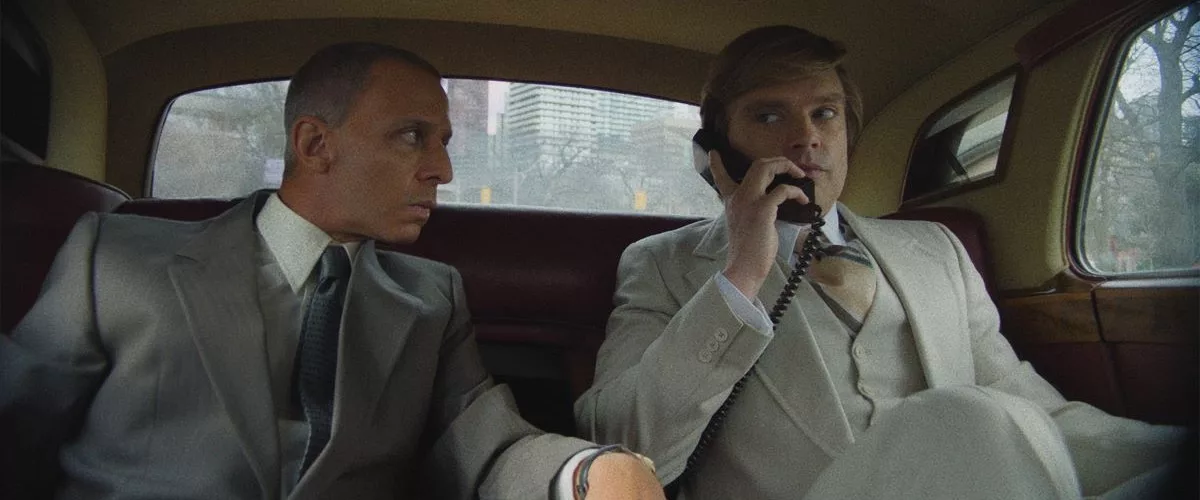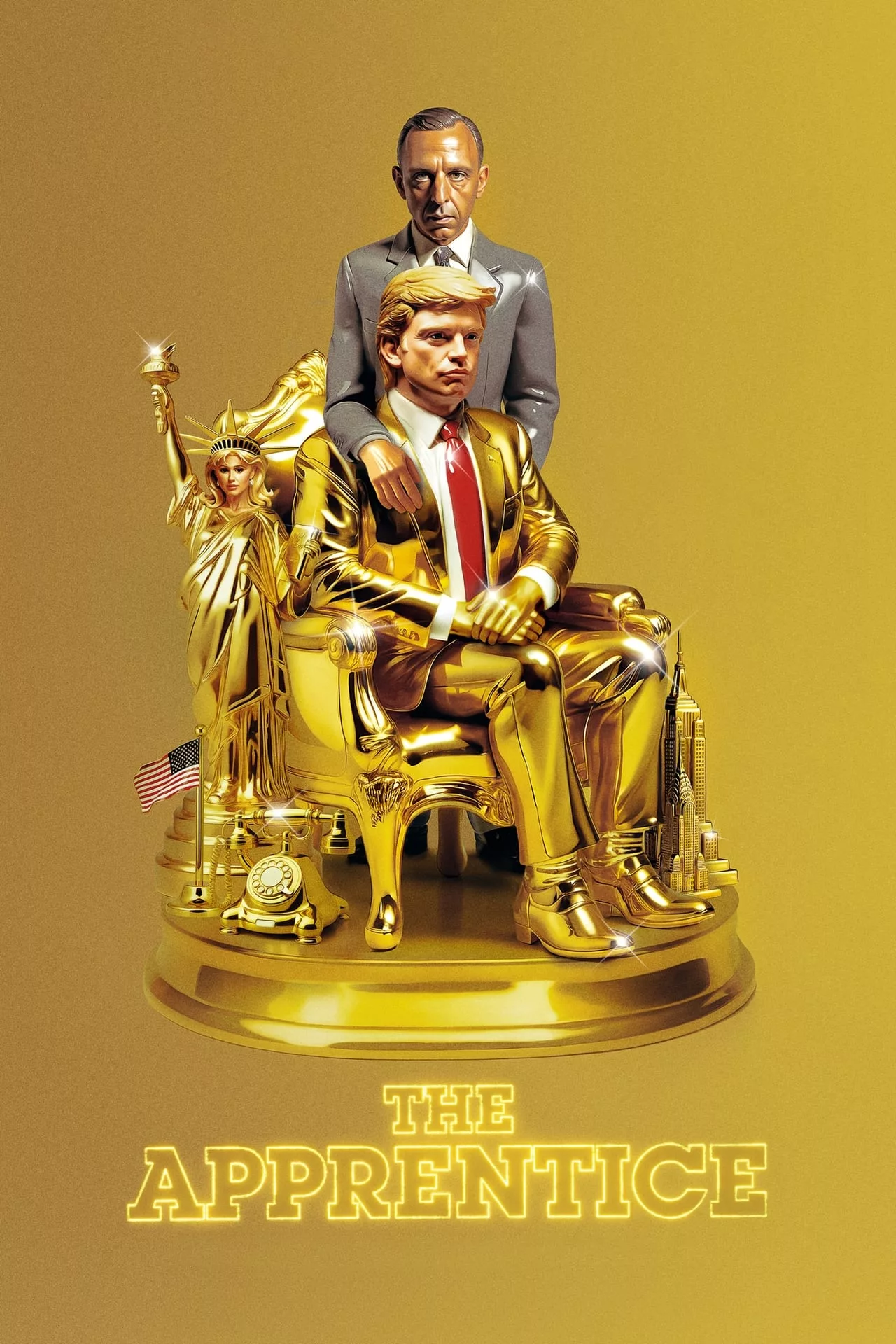The controversial and divisive “The Apprentice” dresses an origin story of Donald Trump in the clothes of Mary Shelley’s Frankenstein. And who’s the good doctor in this telling? None other than Roy Cohn, who gets some assistance in making his monster from the notoriously vicious Fred Trump.
Director Ali Abassi’s film unfolds in two distinct chapters: an hour in the ‘70s wherein a young, relatively naïve Trump (Sebastian Stan) learns the art of the deal from the relentless manipulative Cohn (Jeremy Strong). Then an hour about a decade later, when Trump has risen to a level of corruption and amorality that he would maintain for most of his life. The first half has an intriguing concept, and is reasonably well-told, but the second half falls apart due a distinct lack of POV, or much to say about its subject. Writer Gabriel Sherman gets lost in the woods of what we know about Trump, dropping in references and personality quirks like a Marvel writer uses Easter eggs, leaving the whole exercise feeling as hollow as a late-night comedy sketch. Through it all, the performers hold their heads above water, but “The Apprentice” feels like it ultimately lands on “There’s no explanation for this guy beyond greed and capitalism.” That feels shallow and easy.
Sherman is a journalist by nature, and the sections in which it feels like “The Apprentice” is using his knowledge base about the New York political and real estate landscapes of the ‘70s to full effect are the film’s strongest. Stan imbues young Trump with what could be called growing confidence—he’s willing to follow Strong’s Roy Cohn into the bathroom to schmooze him into helping him get his famous hotel on 42nd Street built (property taxes be damned). Strong plays Cohn as a shark often surrounded by fishes, but he also captures how he saw something he could mold in young Donald. He notoriously teaches the future President three tenets of life and business that he later repeats as his own while working on The Art of the Deal:
- Attack, attack, attack.
- Admit nothing, deny everything.
- Claim victory, and never admit defeat.
It’s easy to see these business and political practices in the lives of both Cohn and Trump, but watching them being planted and fertilized in the young version of him makes for interesting cinema. While it’s underdeveloped in the script, one could argue he starts to employ these three beliefs outside of the office, too, in his relationships with his family and the girl who catches his eye one night, Ivana (Maria Bakalova). The Oscar-nominated star of the sequel to “Borat” nails her too-few scenes, refusing to play Ivana as the two-dimensional trophy wife she was often portrayed as in the press in the ‘80s.
Just as “The Apprentice” feels like it’s building momentum, it jumps to the mid-‘80s, catching up with a very different Trump and Cohn, just as the former’s star is rising as a beacon of Reagan-era capitalism, and he plans the launch of Trump Tower. Why Sherman and Abbasi simply time jump over the development of a person they clearly believe to be a monster is baffling. It’s literally like jumping from the prologue to the epilogue of a life story, forcing us to connect the dots between these two important chapters. The point seems to be that Cohn and Trump have switched places, as the former watches his partner die of AIDS, and realizes that his one-time apprentice no longer has any room in his life for a former ally. The idea that we’re supposed to feel sympathy for a monster like Cohn as he looks upon the horror that he’s wrought is morally dicey, to say the least.
Abbasi’s cheeky approach begins to feel like parody, alternating between easy jokes and obvious lines for nearly all of the second half, while the smartest material in the film—the Cohn/Trump dynamic—takes a back seat. We get nods to MAGA, and Stan punches the word “loser,” and it’s hard not to think of Alec Baldwin’s “SNL” impression once or twice. Even the richer material starts to feel superficial; lines like “You have to be willing to do anything to win” feel like an easy way to explain away Trump’s many complications. Lots of people are willing to do anything to win. They don’t all become Trump.
“The Apprentice” ends with a scene designed to brush away any dissatisfaction at the superficiality of the previous two hours, basically arguing that there is no way to explain how we got here. A young real estate magnate with a judgmental dad found a new kind of father figure in Roy Cohn, and that relationship changed world politics forever. That’s about it. It feels like something that could have worked better in a book, where the writer could offer more details and fill in some of the gaps between the ‘70s and ‘80s versions of the future President. Instead, the film often doesn’t know what to say about its subject or what we should do with him now. And brushing it all off with a “Well, that’s just how this guy was” feels way too easy.
Is this a satire of the American Dream? A horror movie about how it became a nightmare? Or a comedy about a buffoon who basically stumbled into the men’s room on the right day? It seems unwilling to really answer these questions, content to substitute easy shots for difficult conversations about capitalism, politics, family, and marriage. Maybe there’s just too much to say about Donald Trump for a two-hour movie. I have the feeling this won’t be the last attempt to figure him out.
This review was filed from a special screening at Fantastic Fest. It opens on October 11th.




















